Cats are natural explorers, and their curious nature often leads them to taste various objects around the house. As much as we love our furry feline friends, it’s important to be aware of potential hazards in our homes, such as spices like pepper. Pepper is a commonly used spice that adds flavor to many dishes, but pet owners are still unsure whether it’s toxic for cats.
As an expert in pet care and a passionate cat lover, I’m here to provide you with valuable information on whether or not pepper is safe for your feline friend. In this blog post, we’ll explore the effects of pepper on cats, its toxicity level, and the symptoms you should watch out for if your cat ingests pepper. Whether you’re a new cat owner or have been caring for cats for years, understanding the dangers certain foods pose can help keep your furry friend safe from harm.
So, grab a cup of tea and get ready to dive into this spicy topic. By the end of this post, you’ll have a better idea of whether or not you should add pepper to your cat’s diet.
Let’s get started.
Types of Pepper and their Effects on Cats
Pepper is a ubiquitous seasoning in most kitchens, with varieties such as black, white, and cayenne being the most common. However, when it comes to feeding cats, it’s essential to note that not all types of pepper are created equal. While some are safe in small amounts, others can be harmful to our feline friends.
Black pepper is the go-to choice for many cooks worldwide. It has a distinct flavor profile that can add punch to soups and stews. However, giving your cat too much black pepper can lead to digestive upset such as vomiting or diarrhea. Thus, it’s best to err on the side of caution and avoid feeding your furry friend any black pepper.
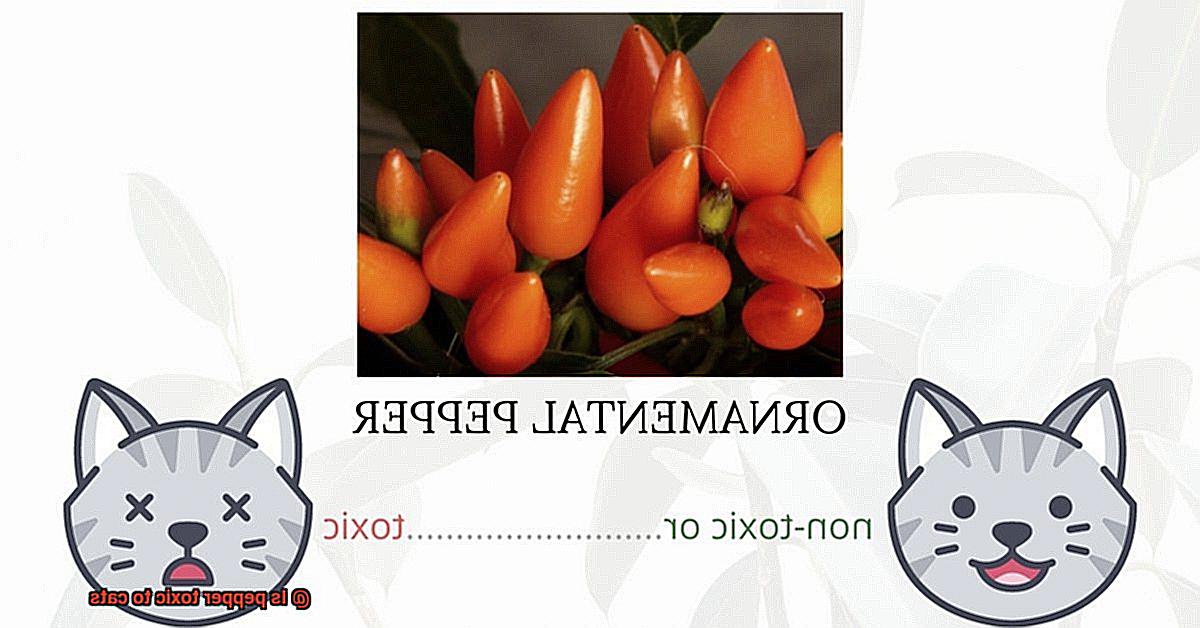
White pepper has a milder taste than its black counterpart and is often used in dishes where black specks of pepper are unwanted. Although small amounts of white pepper are safe for cats to consume, large quantities can still cause digestive issues.
On the other hand, cayenne pepper is a definite no-no when it comes to feeding cats. This fiery spice contains capsaicin, which can cause severe burning sensations in both humans and animals alike. Ingesting cayenne pepper can lead to vomiting, diarrhea, and even liver damage in cats.
Aside from pepper itself, some spices that often go hand-in-hand with it can also be toxic to cats. Onion and garlic powder are two such examples that can damage their red blood cells, leading to anemia. Therefore, always read ingredient labels carefully and avoid feeding your cat any spices that might be harmful to their health.
Amount of Pepper to Feed Your Cat
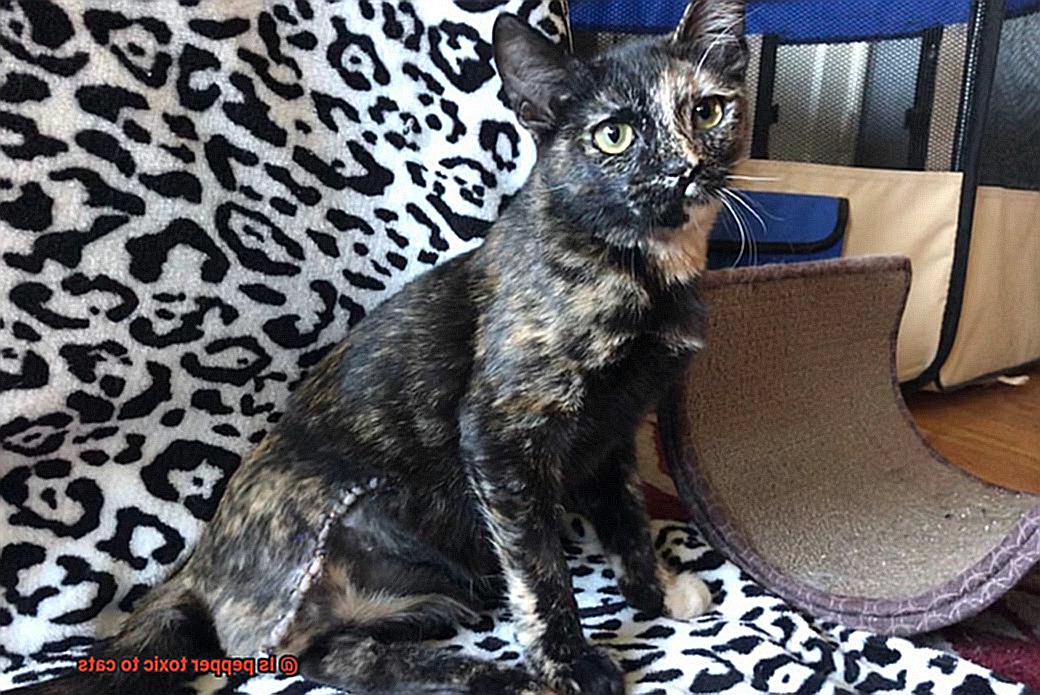
While this spice may add some flavor to your meals, it can cause serious digestive issues for our furry friends.
It’s essential to understand that cats are carnivores. Their bodies are built to process meat-based diets, not spicy seasonings like pepper. When we feed our cats human food, it should be done with caution and in moderation.
Pepper contains capsaicin, which is responsible for its spicy flavor. This compound can cause discomfort and even pain for cats when consumed in large amounts. Even a small amount of pepper can cause gastrointestinal irritation and upset stomachs for our feline friends.
If you decide to give your cat a taste of pepper, it’s crucial to monitor their reaction closely. Watch out for signs of digestive distress such as vomiting, diarrhea, and lethargy. If you notice any of these symptoms, stop feeding your cat pepper immediately and consult with your veterinarian.
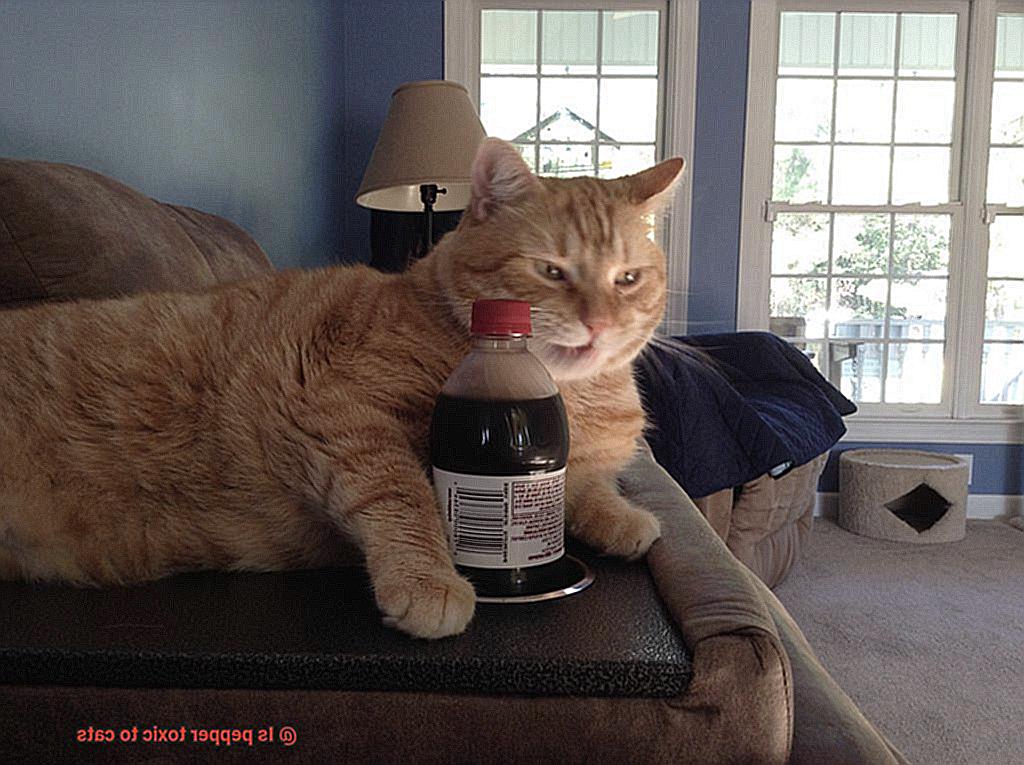
However, is it worth risking your cat’s health for a little spicy flavor? Instead of feeding them human food, stick to a balanced and nutritionally complete diet formulated specifically for cats. This way, you can ensure that your cat is getting all the nutrients they need without risking any potential health complications from pepper or other human foods.
Common Spices Used with Pepper that are Toxic to Cats
While pepper itself is not harmful to cats, certain spices commonly used with pepper can be toxic to our furry companions.
Garlic is one of the most frequently used spices that pairs well with pepper. However, it contains compounds called thiosulphates that can damage a cat’s red blood cells, leading to anemia. Even small amounts of garlic can be toxic to cats. To keep your cat healthy, it’s best to avoid feeding them any foods containing garlic.
Onion is another spice that is often used in cooking with pepper. Like garlic, onion also contains thiosulphates that can cause anemia in cats. In addition, onions can cause gastrointestinal upset and damage to a cat’s digestive system.
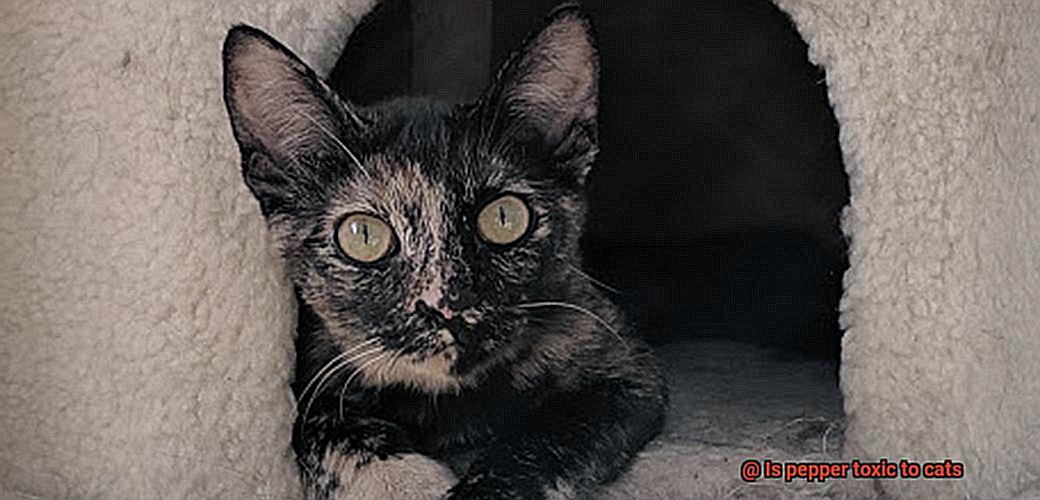
Other commonly used spices such as cumin, turmeric, and paprika are not toxic in small amounts. However, if ingested in large quantities, they have the potential to cause gastrointestinal upset. It’s essential to note that some cats may be more sensitive to particular spices than others. Therefore, always monitor your cat for any signs of illness or discomfort after feeding them seasoned or spiced food.
It’s best to stick to plain, unseasoned foods when feeding your cat. Instead of relying on potentially harmful spices and seasonings, consider using a specially formulated cat food that meets all their nutritional needs. This will add flavor while keeping them healthy.
Signs and Symptoms of Pepper Poisoning in Cats
That’s why it’s important to know about potential dangers that certain foods and spices can pose to your cat. One such spice that can be harmful is pepper. While black pepper in small amounts may not be toxic, larger amounts can lead to gastrointestinal upset and other symptoms. However, chili peppers and cayenne peppers are much more dangerous for cats.
If you suspect that your cat has been exposed to pepper, it’s crucial to be aware of the signs and symptoms of pepper poisoning. Vomiting, diarrhea, and respiratory distress are all common symptoms that could indicate that your cat has been poisoned by pepper. Other signs may include lethargy, loss of appetite, and dehydration. These symptoms can vary in severity depending on the level of exposure.
It’s important to understand that not all types of pepper are toxic to cats. So, don’t panic if your cat accidentally ingests a small amount of black pepper. However, if your cat has ingested a larger amount or if it has eaten chili or cayenne peppers, seek veterinary care immediately.
Your veterinarian may recommend treatments such as supportive care, anti-inflammatory medications, or IV fluids to help alleviate your cat’s symptoms and prevent further complications. It’s essential not to delay seeking professional help for your cat, as prompt treatment can make all the difference.
To keep your cat safe from harmful substances like pepper, stick to plain and unseasoned foods or specially formulated cat food. By staying vigilant and informed, you can help protect your beloved pet from the dangers of pepper poisoning.
Prevention and Treatment for Pepper Poisoning in Cats
However, it’s important to remember that some of these items can be toxic to your feline friend, including the common spice, pepper. If your cat ingests pepper or any spicy foods, it can cause serious health issues that require immediate attention. In this article, we’ll discuss the prevention and treatment methods for pepper poisoning in cats.
Prevention is the key to keeping your cat safe from pepper poisoning. The first step is to keep all spicy foods out of your cat’s reach. This means storing food items in cabinets or on high shelves where your cat cannot access them. Additionally, ensure that garbage cans are tightly sealed to prevent your curious cat from rummaging through them.
Educating others about the dangers of giving spicy foods to cats is also crucial. Many people are unaware of the potential hazards that spices like pepper can pose to feline health. By spreading awareness, you can help prevent accidental ingestion and keep your cat safe.
If you suspect that your cat has ingested pepper or any food that contains it, don’t hesitate to seek veterinary attention immediately. The symptoms of pepper poisoning in cats include vomiting, diarrhea, drooling, and respiratory distress. These symptoms can be severe and require prompt medical intervention.
When you take your cat to the vet, they may induce vomiting to remove the pepper from your cat’s system. They may also administer medications such as anti-nausea medication or activated charcoal to absorb any remaining toxins. In severe cases, hospitalization may be required for supportive care such as intravenous fluids and oxygen therapy.
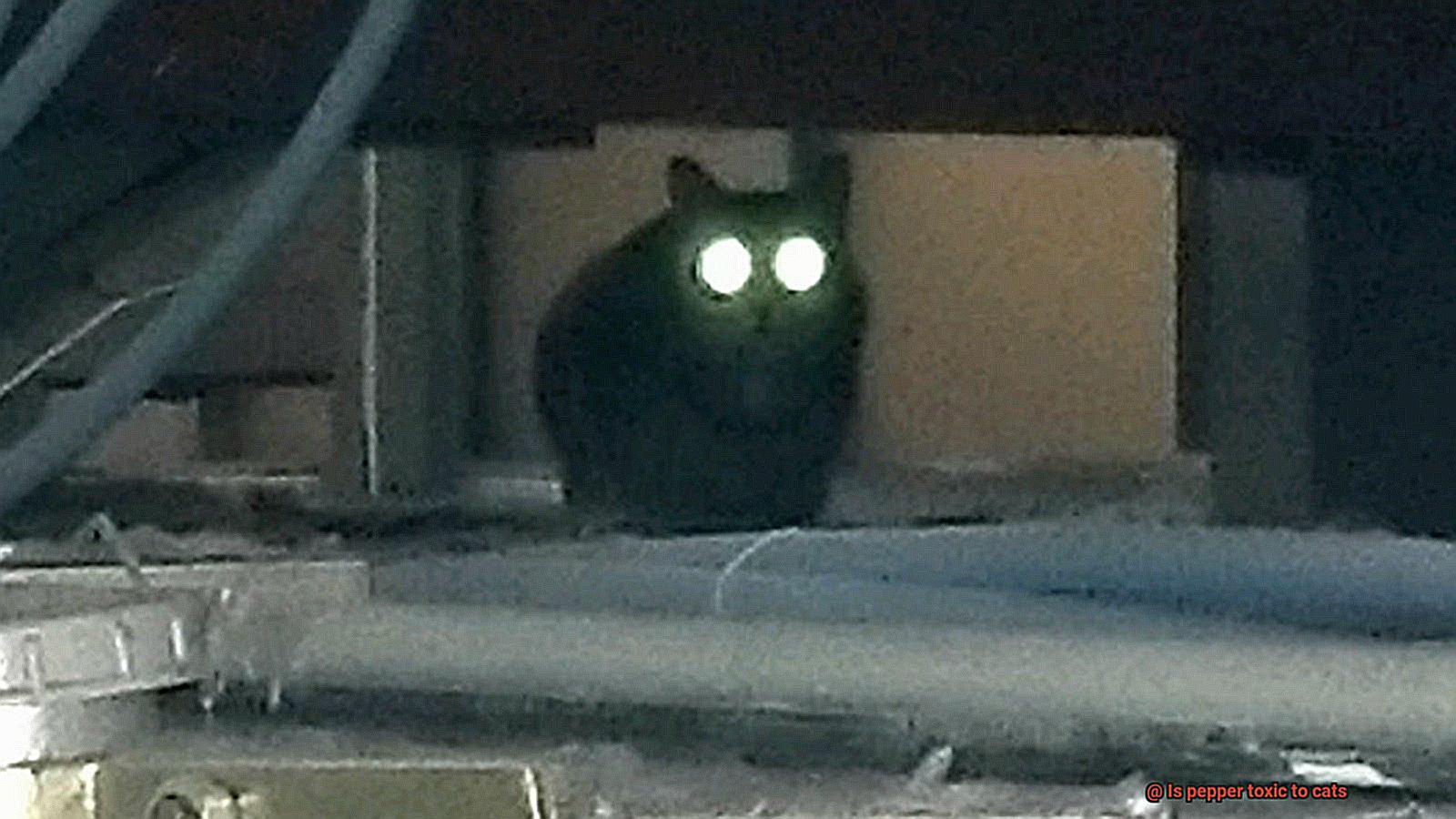
It’s important to closely monitor your cat during their recovery period and follow the veterinarian’s instructions. Your furry friend may need to be kept under observation for several days until they fully recover.
When to Consult a Veterinarian
First, it’s essential to know that consuming pepper is not toxic to cats in small amounts. However, it’s still crucial to keep an eye on your cat’s behavior and health after they’ve ingested any amount of pepper. As a responsible pet owner, you should be on the lookout for any unusual symptoms or behaviors in your cat after they’ve consumed pepper.
If you notice any of the following symptoms like vomiting, diarrhea, lethargy, loss of appetite, or difficulty breathing in your cat after consuming pepper, don’t wait, seek veterinary attention immediately. Even if your cat has consumed only a small amount of pepper, certain types of pepper such as black pepper can be more irritating to a cat’s digestive system than others.
It’s always better to be safe than sorry when it comes to your pet’s health. Think of your cat’s health like a delicate plant that needs proper care and attention. If your cat is not feeling well after consuming any substance, including pepper, take them to the veterinarian for a check-up. Your vet will evaluate their health and provide you with guidance on how best to proceed.
Remember that prevention is key. Keep all spicy foods out of your cat’s reach, and educate others about the hazards of giving spicy foods to cats to avoid accidental ingestion. In case of any doubt or suspicion of pepper poisoning, don’t hesitate to consult with a professional.
4CmKWyNuj-I” >
Conclusion
As a cat owner, it’s important to keep your feline friend safe from potential hazards in your home. While spices like pepper are commonly used in cooking, they can be harmful to cats if ingested. Black and white pepper may only cause digestive upset, but cayenne pepper is much more dangerous and can lead to severe symptoms like vomiting, diarrhea, and liver damage.
To ensure the safety of your cat, it’s crucial to recognize the signs and symptoms of pepper poisoning and seek veterinary attention immediately if you suspect your cat has ingested any amount of pepper. Prevention is key when it comes to keeping your cat safe from harmful substances like pepper. Store all spicy foods out of reach, keep garbage cans tightly sealed, and educate others about the dangers of giving spicy foods to cats.
If your cat does ingest pepper or any other toxic substance, don’t hesitate to seek veterinary care right away. Your vet may induce vomiting or administer medications to absorb any remaining toxins. In severe cases, hospitalization may be necessary for supportive care.
In conclusion, while small amounts of black or white pepper may not be toxic for cats, it’s best to stick with plain and unseasoned foods or specially formulated cat food.







